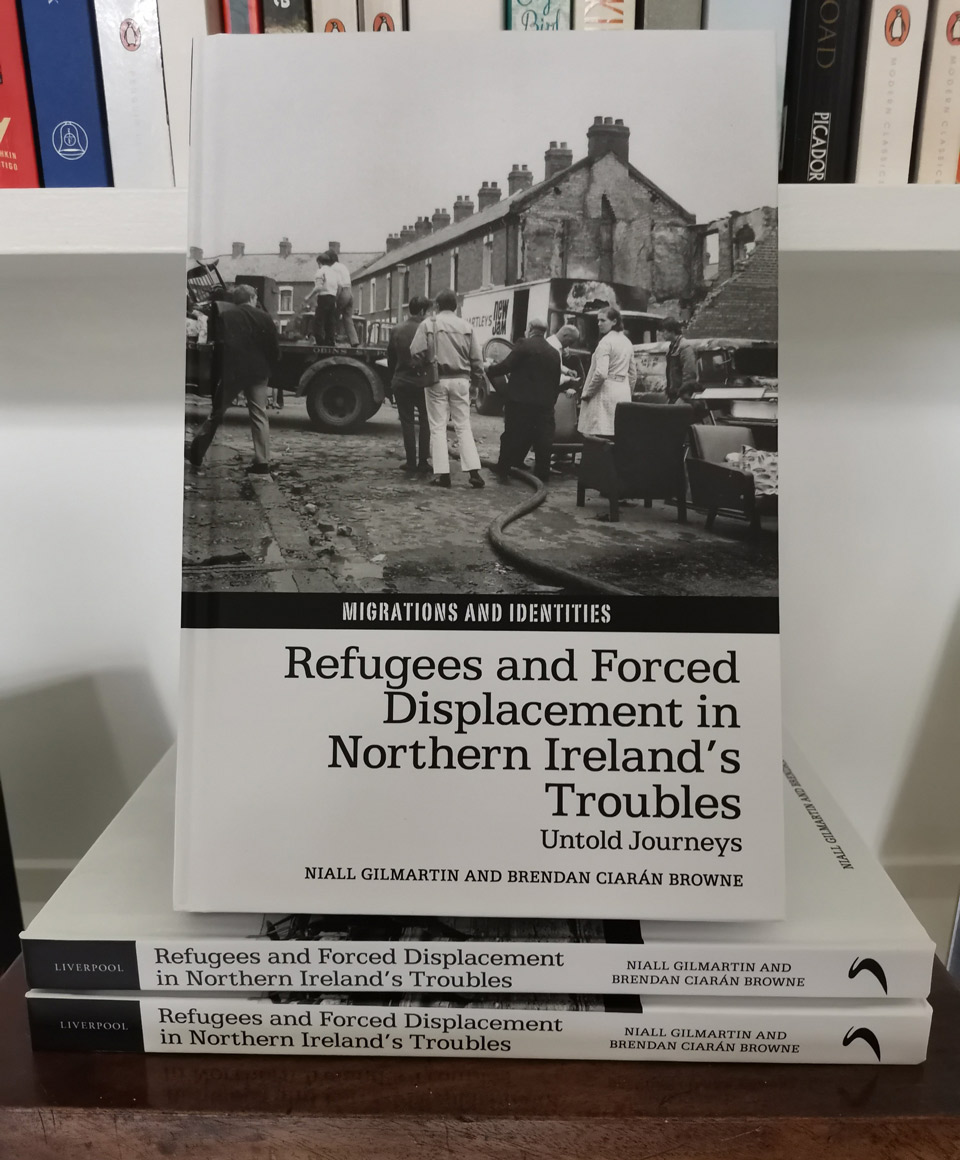Between the Lines: Brendan Ciarán Browne
 When did you first come up with the idea for the book?
When did you first come up with the idea for the book?
This is a co-authored book with Dr Niall Gilmartin and, when we realised we were both doing research on conflict and displacement during the Northern Ireland ‘Troubles’, we thought let’s work together! The book idea was hatched in 2017 when both Niall and I were working at Trinity. From my perspective, the desire to do the research has always been there – my dad was forced from his home during the ‘Troubles’ in the mid 1970s, one of so many thousands of people across the north of Ireland, and so his personal experience is one that I was always interested in learning more about.
Did you start out with the intention of writing a book about a particular topic, or did a book begin to make sense as you were researching?
No – the book was never really the intention (for me at least). I had been gathering some victim and survivor testimonies of forced displacement with my friend and colleague, an artist and film-maker in the United States, Casey Asprooth-Jackson, with the intention of showcasing these by way of an art installation in Belfast (which we did in 2019, entitled: Burn/T Out – see here for review). As soon as I met up with Niall, however, we saw the potential for the book, and really just took it from there.
What are the book’s main ideas?
The book examines forced displacement as a central and pervasive feature of the Northern Ireland ‘Troubles,’ affecting tens of thousands of citizens. Remarkably it has been afforded little more than a footnote or fleeting reference in most accounts of the conflict. This book seeks to ‘end the silence’ surrounding this neglected and ubiquitous aspect of the conflict.
Based on 88 in-depth qualitative interviews with victims and survivors, and extensive secondary research, this study provides the first comprehensive examination of forced displacement in Northern Ireland and the analysis presented captures the unique perspectives of those forcibly uprooted over the course of the 30-year conflict and places on historical record their stories and experiences.
Our work challenges and broadens prevailing understandings of conflict-related violence, harm, and loss in Northern Ireland to demonstrate the centrality of forced movement, territory, and demographics to the roots and subsequent trajectory of the Troubles. In doing so, it shows that to fully understand the eruption and outplaying of the Troubles and its elusive peace, engagement with and understanding of the legacy of forced displacement is crucial.
What did writing a book allow you to do that wouldn’t have been possible in another medium eg. journal article?
It allowed us to gather up in one complete volume many more testimonies than would have been possible to reflect on in an article. Also, the book felt like an essential way of capturing and storing these experiences, ensuring a historical record is retained of the traumas and loss felt by so many.
How did you decide which publisher to place the book with?
Niall (co-author) had been engaged in postdoctoral work with Liverpool University, their press has a good record of publishing work on Northern Ireland and we knew some staff in the Institute of Irish Studies in Liverpool who gave us some good advice on the work and who championed the Press as a possible outlet.
How long did it take to write?
Gulp… approximately 5 years… however, we have a good excuse! The pandemic really impacted our ability to finish interviews and to focus exclusively on writing. Everyone was impacted in so many ways when the world shut down in 2020, this included our ability to prioritise the writing. However, once we managed to open up from lockdown, the writing process went full steam ahead!
Did you ever experience any moments of writer’s block? What did you do to overcome this?
Of course. It’s always the way. Sometimes you just have to walk away for a short while and accept that you’re in a different head space. Reading is also a great way of breaking through the writing impasse.
What advice would you give someone thinking about writing a book?
There are a couple of separate points. If writing as a co-author, my advice is to make sure you get on well. I am very lucky to have had the opportunity to work with someone like Niall who was so easy to work with and engaged in the process, and someone whose work I really respect. The other bit of advice would be to set manageable goals/targets… there is no merit in missing deadlines and getting down in the dumps about it. Finally… when you do finish the book and it’s in your hand, try and enjoy the moment without constantly looking to the next project!
Brendan Ciarán Browne
A native of Belfast, Dr Brendan Ciarán Browne is an interdisciplinary scholar with degrees in Law (LL.B, LL.M Human Rights) and a PhD in Sociology. He has held academic and research positions at Queen's University Belfast, Al Quds (Bard) University, Palestine and is currently Assistant Professor of Conflict Resolution, Trinity College Dublin. His research interests are focused on transitional justice, settler colonialism and liberal peacebuilding, and conflict and forced displacement.
- Buy Refugees and Forced Displacement in Northern Ireland’s Troubles
- Visit Brendan’s website
- Follow Brendan on Twitter
- Find Brendan on LinkedIn

